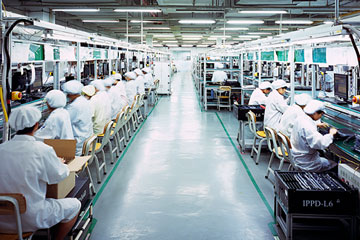
A Foxconn plant in Shenzhen, which puts together, among other products, the iPhone.
(4 of 7)
Li could be speaking for his entire industry. China has dreams of becoming a rival to the U.S. and Japan in car manufacturing, but despite bottomless investment and state protection, the country's carmakers have not been able to compete head-to-head with foreign players. At home, international brands like Chevy, Volkswagen and Hyundai dominate 70% of the passenger-car market, according to research firm LMC Automotive. Overseas, Chinese exports are often driven by price-conscious consumers in poor nations. Geely and other Chinese carmakers have desperately been trying to improve by investing heavily in R&D and automation, and they are making progress. But the most recent quality survey from the market-research firm J.D. Power shows Chinese-branded cars still suffer 49% more initial defects and other problems than international ones sold in China. "Putting together long-lasting, world-tested products--it takes years," says Kevin Wale, former president of GM in China. Chinese carmakers "are still going through a learning phase."
Even when Chinese firms work hard to catch up, they find their foreign rivals haven't stood still waiting for them. Shipbuilding, an industry targeted by the state as strategic, added tremendous capacity over the past decade, and China overtook South Korea as the world's largest producer of vessels. But Chinese yards generally export ships of older, simpler design that command lower prices, while the Koreans have advanced into more expensive, technologically superior products like supersize container ships and sophisticated drilling vessels for the energy industry. "The Koreans are much more mature in R&D and quality," says Natalie Burrows, an analyst at London-based Clarksons Research. "They are streaks ahead" of the Chinese.
INNOVATION DOESN'T COME EASY.
There are clearly innovative firms in China. Shenzhen-based Tencent is well known for its creative Internet and mobile services, typified by its wildly popular messaging system, WeChat. Xiaomi has become a competitor to Apple in China with its low-cost smartphones--even though it is a mere three years old. However, the innovation that takes place in China tends to build upon existing technology, not generate revolutionary ideas. In a recent KPMG report, 37% of the technology executives surveyed believed that the U.S. holds the most promise for producing disruptive technologies over the next four years, while only 24% thought China does. China hasn't developed the track record or financial networks to support the sort of speculative research that can spawn big-time innovation but often takes years to bear fruit. Jeff Richards, a partner at GGV Capital, a venture-capital firm with operations in both Shanghai and Menlo Park, Calif., says Silicon Valley has a clear edge: "It has an advantage in that it has an ecosystem to make big breakthroughs."
